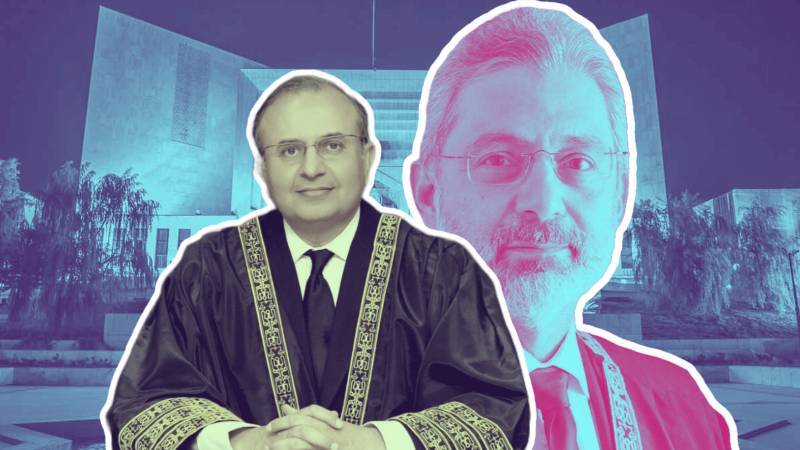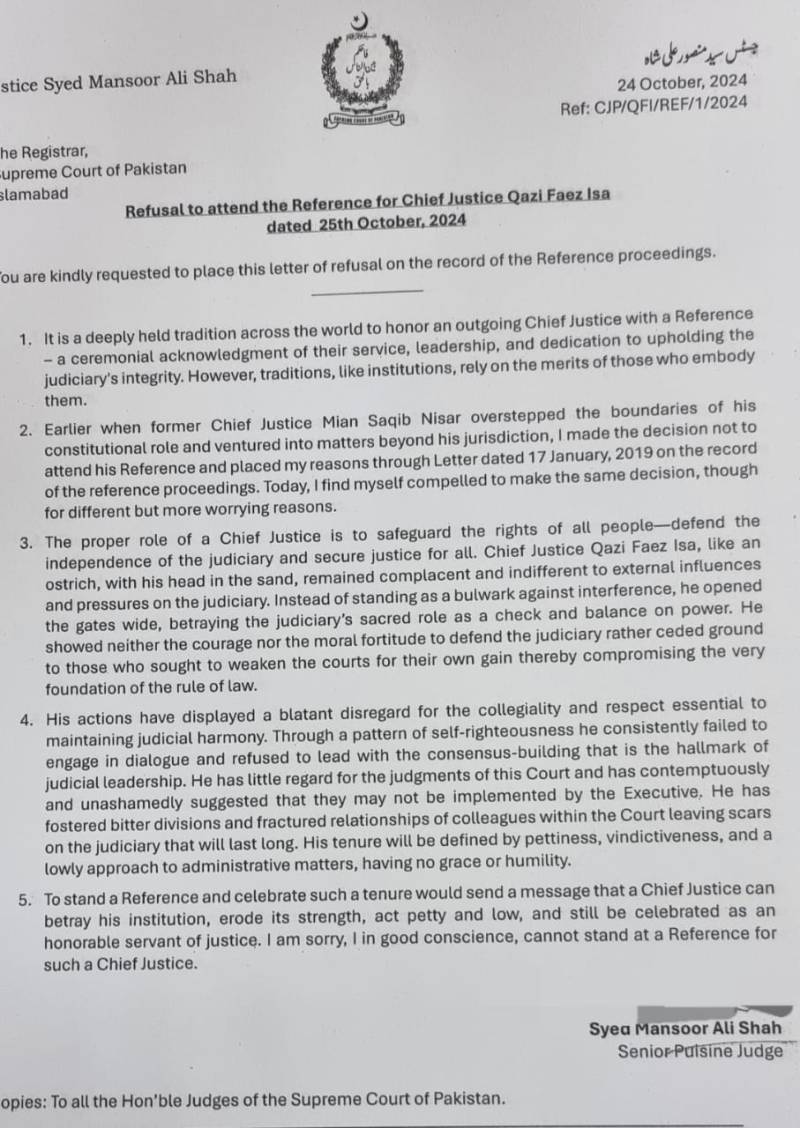
Justice Mansoor Ali Shah Friday broke his silence over his cold war with outgoing Chief Justice Qazi Faez Isa and expressed his extreme displeasure at the state of affairs in the Supreme Court before refusing to attend the full court reference summoned in honour of the departing chief justice.
On Friday, Justice Mansoor Ali Shah wrote a terse letter to the Supreme Court Registrar with express directions to place his concerns with CJP Isa on the record as he refused to attend the ceremonial reference being held in the outgoing judge's honour. Several other top court judges also reportedly refused to attend CJP Isa's full court reference on Friday,, including Justice Munib Akhtar, Justice Ayesha Malik and Justice Athar Minallah.
"Today, I find myself compelled to make the same decision, though for different but more worrying reasons," stated Justice Shah as he unveiled his charge sheet against CJP Isa.
"I am sorry, I, in good conscience, cannot stand at a Reference for such a Chief Justice," Justice Shah announced.
In his letter, Justice Shah stated that CJP Isa's actions had displayed a blatant disregard for the collegiality and respect essential to maintaining judicial harmony.
"Through a pattern of self-righteousness he (CJP) consistently failed to engage in dialogue and refused to lead with the consensus-building that is the hallmark of judicial leadership," the letter stated.
The letter further accosted the outgoing chief justice of displaying little regard for the judgments of this court and had allegedly "contemptuously" and "unashamedly" suggested that the executive may not implement them.
"He has fostered bitter divisions and fractured relationships of colleagues within the court, leaving scars on the judiciary that will last long."
Justice Shah was in line to succeed CJP Isa as the next chief justice of Pakistan until the 26th Constitutional Amendment changed the process for appointing the new top judge, whereby the third senior-most judge, Justice Yahya Afridi, was notified by the government as the next chief justice. Through his letter, Justice Shah went on to pan CJP Isa's tenure.
"His tenure will be defined by pettiness, vindictiveness, and a lowly approach to administrative matters, having no grace or humility."
Justice Shah said that the proper role of the chief justice was to safeguard the rights of all people, defend the independence of the judiciary, and secure justice for all.
"Chief Justice Qazi Faez Isa, like an ostrich, with his head in the sand, remained complacent and indifferent to external influences and pressures on the judiciary," he said, referring to the multiple instances where external factors impacted the judiciary, from intimidation and surveillance of judges to Parliamentary interference.
"Instead of standing as a bulwark against interference, he opened the gates wide, betraying the judiciary's sacred role as a check and balance on power," he wrote.
"He showed neither the courage nor the moral fortitude to defend the judiciary, rather ceded ground to those who sought to weaken the courts for their own gain, thereby compromising the very foundation of the rule of law."
Justice Shah defended his conscientious decision not to attend the reference for an outgoing judge of the top court by explaining that this was not the first time he had boycotted such a reference.
"Earlier, when former Chief Justice Mian Saqib Nisar overstepped the boundaries of his constitutional role and ventured into matters beyond his jurisdiction, I made the decision not to attend his reference and placed my reasons through a letter dated January 17, 2019, on the record of the reference proceedings.
It is a deeply held tradition across the world to honour an outgoing Chief Justice with a Reference, a ceremonial acknowledgement of their service, leadership, and dedication to upholding the
judiciary's integrity," he said.
"However, traditions, like institutions, rely on the merits of those who embody them."
Justice Shah concluded: To stand a Reference and celebrate such a tenure would send a message that a Chief Justice can betray his institution, erode its strength, act petty and low, and still be celebrated as an honourable servant of justice."


